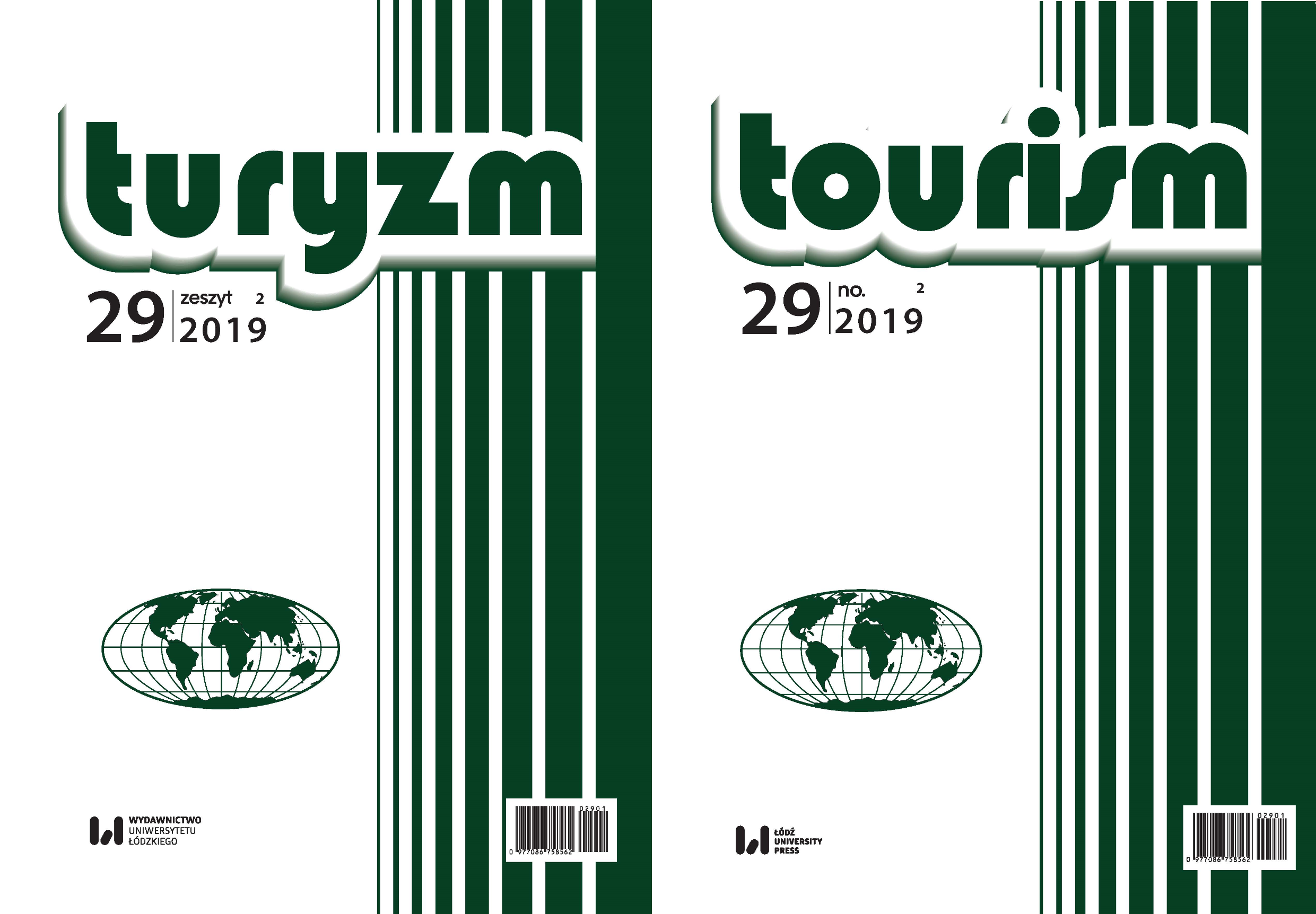Motivations for running in men: A comparative analysis of local runners and sports tourists
DOI:
https://doi.org/10.18778/0867-5856.29.2.07Keywords:
motives for running, mass sporting event, sports tourismAbstract
The aim of the study is to to examine the motivations for participating in a half-marathon among two groups of runners, local running in their place of residence and sports tourists, and to evaluate the differences between them. With the increase in the popularity of ‘running tourism’ the question becomes important as it encourages runners to engage in physical activity outside their everyday place of residence. Freyer and Gross’s (2002) four types of motivation for participation in sports events was the basis for the development of the author’s questionnaire. The empirical research (sample size=346) then recognized these motives for participation. The article also presents a review of the literature on such motivations in mass running events. Results indicate that both group of respondents, residents of the place where the half-marathon was organised and sports tourists, have different forms of motivation. The greatest relevance for sports tourists turned out to be motivation for sensation-seeking but for local runners it was the result, and this confirms that sports tourists travel generally in search for strong emotions and sensations.
Downloads
References
Aicher, T., Karadakis, K., Eddosary, M. (2015). Comparison of sports tourists’ and locals’ motivation to participate in a running event. International Journal of Event and Festival Management, 6 (3), 215-234.
Google Scholar
Alexandris, K., Carroll, B. (1997). An analysis of leisure constraints based on different recreational sports levels: Results from a study in Greece. Leisure Science, 19 (1), 1-15.
Google Scholar
Alexandris, K., Tsorbatzoudis, Ch., Grouios, G. (2002). Perceived constraints on recreational sports participation: Investigating their relationship with intrinsic motivation, extrinsic motivation and amotivation. Journal of Leisure Research, 2 (34), 233-252.
Google Scholar
Biernat, E., Piątkowska, M. (2012). Recreational physical activity of Poles in the light of Europe – report. Warszawa: Ministerstwo Sportu i Turystyki.
Google Scholar
Briere, N.M.; Vallerand, R.J.; Blais, M., Pelletier, L.G. (1995). Developpement et validation d’une mesure de motivation intrinsfeque et extrinseque et d’amotivation en contexte sportsif: L’Echelle de Motivation vis-à-vis les Sports (EMS). International Journal of Sports Psychology, 4 (26), 465-489.
Google Scholar
Carmack, M.A., Martens, R. (1979). Measuring commitment to running: A survey of runners’ attitudes and mental states. Journal of Sports Psychology, 1 (1), 25-42.
Google Scholar
Chappelet, J.L. (2015). Heritage sportsing events and place marketing. In: M. Plevnik (ed.), Sustainable development of sports tourism. Koper: Annales University Press.
Google Scholar
Clough, P.J., Sheper, J., Maugha, R. (1989). Motives for participation in recreational running. Journal of Leisure Research, 21 (4), 297-309.
Google Scholar
Crawford, R. (1977). You are dangerous to your health: The ideology and politics of victim blaming. International Journal of Health Services, 7 (4), 663-680.
Google Scholar
Crawford, R. (1980). Healthism and the medicalization of everyday life. International Journal of Health Services, 10 (3), 365-388.
Google Scholar
Crawford, R. (1994). The boundaries of the self and the unhealthy other: Reflections on helth, culture and AIDS. Social Science and Medicine, 38 (10), 1347-1365.
Google Scholar
Crawford, R. (2004). Risk ritual and the management of anxiety in medical culture. Health: An Interdisciplinary Journal for the Social Study of Health, Illness and Medicine, 8 (4), 505-552.
Google Scholar
Crawford, R. (2006). Health as a meaningful social practice. Health: An Interdisciplinary Journal for the Social Study of Health, Illness and Medicine, 10 (4), 401-420.
Google Scholar
Crowne, D.P., Marlowe, D. (1960). A new scale of social desirability independent of psychopathology. Journal of Consulting Psychology, 24 (4), 349-354.
Google Scholar
Cudowska, A. (2010). Wspólnota w kulturze indywidualizmu. Retrieved from: https://repozytorium.uwb.edu.pl/jspui/bitstream/11320/2729/1/Agata%20Cudowska_Wsp%c3%b3lnota%20w%20kulturze%20indywidualizmu.pdf (13.08.2019).
Google Scholar
Curtis, J., McTeer, W. (1981). The motivation for running. Canadian Runners, 1, 18-19.
Google Scholar
De Pero, R., Amici, S., Benvenuti, C., Minganti, C., Capranica, L., Pesce, C. (2009). Motivation for sports participation in older italian athletes: The role of age, gender and competition level. Sports Science and Health, 5 (2), 61-69.
Google Scholar
Deci, E.L. (1975). Intrinsic motivation. New York: Plenum.
Google Scholar
Deci, E.L., Ryan, R.M. (1985). Intrinsic motivation and self-determination in human behavior. New York: Plenum Press.
Google Scholar
Deci, E.L., Ryan, R.M. (2000). Intrinsic and extrinsic motivations: classic definitions and new directions. Contemporary Educational Psychology, 25 (1), 54-67.
Google Scholar
Deci, E.L., Ryan, R.M. (1991). A motivational approach to self: Integration in personality. In: R. Dienstbier (ed.), Nebraska symposium on motivation: Perspectives on motivation. Vol. 38 (pp. 237-288). Lincoln, NE: University of Nebraska Press.
Google Scholar
Deci, E.L. Ryan, R.M. (2000). The “what” and “why” of goal pursuits: Human needs and the self-determination of behavior. Psychological Inquiry, 11 (4), 227-268.
Google Scholar
Doganis, G. (2000). Development of a Greek version of the sports motivation scale. Perceptual and Motor Skills, 90 (2), 505-512.
Google Scholar
Domański, H. (2000). Polska klasa średnia. Wrocław: Wydawnictwo Uniwersytetu Wrocławskiego.
Google Scholar
Freyer, W., Gross, S. (2002). Tourismus und sports-events. Dresden: FIT Forschungsinstitut für Tourismus.
Google Scholar
Gibson, H., Kaplanidou, K., Kang, S.J. (2012). Small-scale event sports tourism: A case study in sustainable tourism. Sports Management Review, 15 (2), 160-170.
Google Scholar
Gill, D.L., Deeter, T.E. (1988). The development of the sports orientation questionnaire. Research Quarterly for Exercice and Sports, 59 (3), 191-202.
Google Scholar
Johnsgård, K. (1985). The motivation of the long distance runner. Journal of Sports Medicine, 25, 135-139.
Google Scholar
Kazimierczak, M., Malchrowicz-Mośko, E. (2013). Specific and developmental trends of sports tourism. Folia Turistica, 28, 67-90.
Google Scholar
Lenartowicz, M., Dziubiński, Z., Jankowski, K. (2017). Aktywni Polacy: dwie dekady uczestnictwa w sporcie i rekreacji ruchowej. Próby wyjaśnienia zmian. Kultura i Społeczeństwo, 2, 117-132.
Google Scholar
Masters, K.S., Lambert, M.J. (1989). The relation between cognitive coping strategies, reasons for running, injury, and performance of marathon runners. Journal of Sports and Exercise Psychology, 11, 161-170.
Google Scholar
Masters, K.S., Ogles, B.M., Jolton, J.A. (1993). The development of an instrument to measure motivation for marathon running: The motivation of marathoners scales (MoMS). Research Quarterly for Exercice and Sports, 64 (2), 134-143.
Google Scholar
Ogles, B.M., Masters, K.S. (2003). A typology of marathon runners based on cluster analysis on motivations. Journal of Sports Behaviour, 26 (1), 69-85.
Google Scholar
Ogles, B.M., Masters, K.S., Richardson, S.A. (1995). Obligatory running and gender: An analysis of participative motives and training habits. International Journal of Sports Psychology, 26, 233-248.
Google Scholar
Papanikos, G. (2015). The economic effects of a marathon as a sports tourism event. Athens Journal of Sports, 1 (225), 225-240.
Google Scholar
Report “Physical activity of Poles TNS Poland” (2015). Warsaw: TNS.
Google Scholar
Roberts, C. (2011). Sports and adventure tourism. In: P. Robinson, S. Heitmann, P. Dicke (eds), Research themes for tourism. Oxfordshire-Cambridge, UK: CABI Publisher.
Google Scholar
Ross, D. (2001). What are the characteristics of sport tourists? In: D. Ross, Developing sports tourism. National Laboratory for Tourism. Urbana - Champaign, Illinois: University of Illinois.
Google Scholar
Ryan, M.R. (1995). Psychological needs and the facilitation of integrative processes. Journal of Personality, 63 (3), 397-427.
Google Scholar
Ryan, R.M. Deci, E.L. (2000). Self-determination theory and the facilitation of intrinsic motivation, social development, and well-being. The American Psychologist, 55 (1), 68-78.
Google Scholar
Ryan, R.M. La Guardia, J.G. (2000). What is being optimized over development? A self-determination theory perspective on basic psychological needs across the life span. In: S. Qualls, N. Abeles (eds.), Psychology and the aging revolution (pp. 145-172). Washington: APA Books.
Google Scholar
Schulze, G. (1992). Die Erlebniz-Gesellschaft. Kultursoziologie der Gegenwart, Frankfurt am Main: Campus-Verlag.
Google Scholar
Schwark, J. (2006) Grundlagen zum Sportstourismus. Münster-New York-München-Berlin: Waxmann.
Google Scholar
Stempień, J.R. (2015). Polska moda na bieganie w świetle analizy kohort. Perspektywa socjologiczna. In: M. Zowisło, J. Kosiewicz (eds.), Sports i turystyka w zwierciadle wartości społecznych (pp. 450-460). Kraków: Wydawnictwo Akademii Wychowania Fizycznego w Krakowie.
Google Scholar
Stempień, J.R. (2016). Bieganie, zwiedzanie i klasa średnia – przygarść socjologicznych uwag i obserwacji o turystyce biegowej. In: M. Kazimierczak (ed.), Inspiracje sportem w turystyce kulturowej (39-49). Poznań: Wydawnictwo Akademii Wychowania Fizycznego w Poznaniu.
Google Scholar
Summers, J.J., Sargent, G.I., Levey, A.J., Murray, K.D. (1982). Middle aged, non-elite marathon runners: a profile. Perceptual and Motor Skills, 54 (3), 963-969.
Google Scholar
Szczechowicz, B. (2015). Łączenie wartości turystyki i sportu w świetle analizy ofert rynkowych. In: M. Kazimierczak (ed.), Turystyka sportowa – społeczno-kulturowy potencjał i perspektywy rozwoju (pp. 41-53). Poznań: Wydawnictwo Akademii Wychowania Fizycznego w Poznaniu.
Google Scholar
Taks, M. (2013). Social sustainability of non-mega sports events in a global world. European Journal for Sports and Society, 10 (2), 121-141.
Google Scholar
Taks, M., Green, Ch., Misener, L., Chalip, L. (2014). Evaluationg sports development outcomes: The case of a medium-sized international sports event. European Sports Management Quarterly, 14 (3), 213-237.
Google Scholar
Vallerand, R.J. (1997). Toward a hierarchical model of intrinsic and extrinsic motivation. In: M.P. Zanna (ed.), Advances in experimental social psychology. Vol. 29 (pp. 271-360). San Diego, CA: Academic Press.
Google Scholar
Vallerand, R.J., Deci, E.L., Ryan, R.M. (1987). Intrinsic motivation in sports. In: K.B. Pandolf (ed.), Exercise and sports sciences reviews. Vol. 15 (pp. 389-425). New York: MacMillan.
Google Scholar
Vlachopoulos, S.P., Michailidou, S. (2006). Development and initial validation of a measure of autonomy, competence, and relatedness in exercise: The basic psychological needs in exercise scale. Measurement in Physical Education and Exercise Sciences, 10, 179-201.
Google Scholar
Walczak, M. Tomczak, M. (2011). The structure of psychological determinants of selected aspects of physical activity in the light of the theory of self-determination. Sports and Recreation and the Challenge of Modern Civilization; Scientific Notebooks of Szczecin University, 689; Economic Issues Services, 78, 127-152.
Google Scholar
Zduniak, A. (2010). Event jako ponowoczesna forma uczestnictwa w życiu społecznym. Roczniki Nauk Społecznych, 2 (38), 207-234.
Google Scholar
Zuckerman, M. (1994) Behavioral expressions and biosocial bases of sensation seeking. New York: Cambridge Press.
Google Scholar
Downloads
Published
How to Cite
Issue
Section
License

This work is licensed under a Creative Commons Attribution-NonCommercial-NoDerivatives 4.0 International License.










